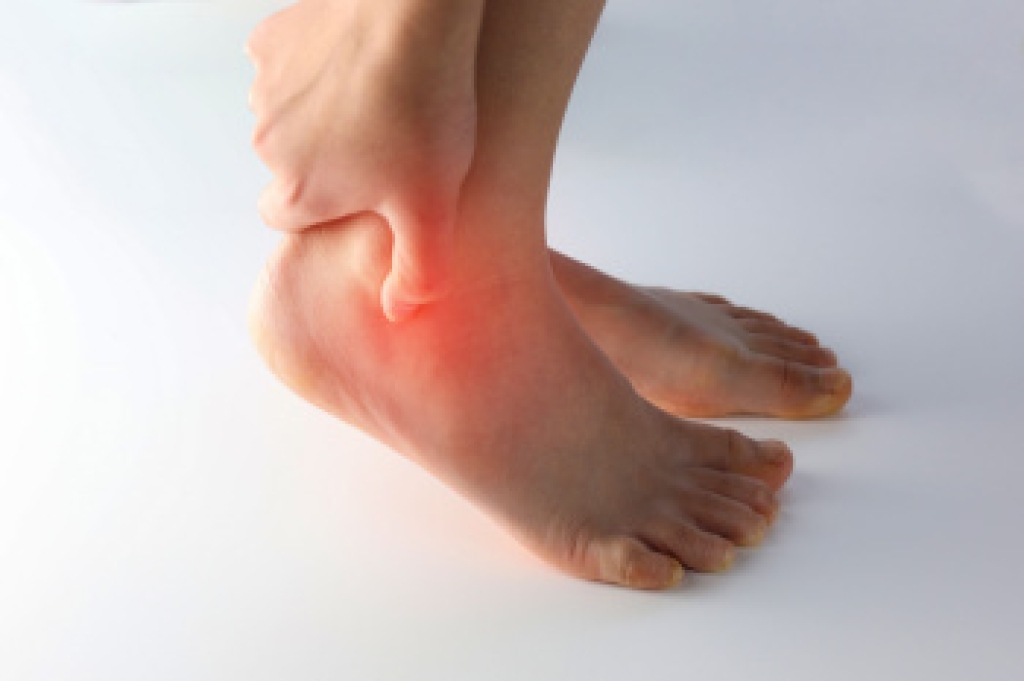Connect With Us
Blog
Blog
Ankle Arthritis Causes and Symptoms

Ankle arthritis is a condition defined by inflammation and degeneration of the ankle joint, leading to pain and reduced mobility. It commonly develops from wear and tear, previous injuries, or excess stress placed on the joint. Symptoms include swelling, stiffness, cracking or grinding sensations, and pain that may worsen with activity. As the condition progresses with time, joint movement can become more limited, and daily activities may feel increasingly difficult. Being overweight can increase pressure on the ankle joint and accelerate joint breakdown. A podiatrist can evaluate ankle arthritis, confirm a diagnosis, and recommend treatments to reduce pain, improve function, and slow progression. If you have symptoms of ankle arthritis, it is suggested that you consult a podiatrist who can offer you effective relief and management tips.
Arthritis can be a difficult condition to live with. If you are seeking treatment, contact the foot specialists from Academy Foot and Ankle Specialists. Our doctors can provide the care you need to keep you pain-free and on your feet.
Arthritic Foot Care
Arthritis is a term that is commonly used to describe joint pain. The condition itself can occur to anyone of any age, race, or gender, and there are over 100 types of it. Nevertheless, arthritis is more commonly found in women compared to men, and it is also more prevalent in those who are overweight. The causes of arthritis vary depending on which type of arthritis you have. Osteoarthritis for example, is often caused by injury, while rheumatoid arthritis is caused by a misdirected immune system.
Symptoms
- Swelling
- Pain
- Stiffness
- Decreased Range of Motion
Arthritic symptoms range in severity, and they may come and go. Some symptoms stay the same for several years but could potentially get worse with time. Severe cases of arthritis can prevent its sufferers from performing daily activities and make walking difficult.
Risk Factors
- Occupation – Occupations requiring repetitive knee movements have been linked to osteoarthritis
- Obesity – Excess weight can contribute to osteoarthritis development
- Infection – Microbial agents can infect the joints and trigger arthritis
- Joint Injuries – Damage to joints may lead to osteoarthritis
- Age – Risk increases with age
- Gender –Most types are more common in women
- Genetics – Arthritis can be hereditary
If you suspect your arthritis is affecting your feet, it is crucial that you see a podiatrist immediately. Your doctor will be able to address your specific case and help you decide which treatment method is best for you.
If you have any questions please feel free to contact our offices located in Southlake, Keller (Fort Worth), Hurst, North Richland Hills, Flower Mound, Argyle, and Denton, TX. . We offer the newest diagnostic tools and technology to treat your foot and ankle needs.
Ankle Pain Caused by Sinus Tarsi Syndrome

Ankle pain caused by sinus tarsi syndrome develops when the small tunnel between the talus and calcaneus becomes irritated or strained. This area helps guide ankle movement, and it can be injured after an ankle sprain, long-term standing, or from feet that roll inward, which increases pressure on the tunnel. Symptoms include pain on the outer front part of the ankle, along with a sense of weakness or wobbling while walking on uneven ground. The ligaments surrounding the tunnel can become irritated, leading to swelling and discomfort with each step. A podiatrist can check foot alignment, look for instability in the ankle, and recommend supportive inserts, bracing, or surgery, if other options do not help. Restoring ankle stability reduces pressure on the sinus tarsi and improves comfort. If you have symptoms of sinus tarsi syndrome, it is suggested that you schedule an appointment with a podiatrist for a diagnosis and options for treatment.
Ankle pain can be caused by a number of problems and may be potentially serious. If you have ankle pain, consult with the foot specialists from Academy Foot and Ankle Specialists. Our doctors will assess your condition and provide you with quality foot and ankle treatment.
Ankle pain is any condition that causes pain in the ankle. Due to the fact that the ankle consists of tendons, muscles, bones, and ligaments, ankle pain can come from a number of different conditions.
Causes
The most common causes of ankle pain include:
- Types of arthritis (rheumatoid, osteoarthritis, and gout)
- Ankle sprains
- Broken ankles
- Achilles tendonitis
- Achilles tendon rupture
- Stress fractures
- Bursitis
- Tarsal tunnel syndrome
- Plantar fasciitis
Symptoms
Symptoms of ankle injury vary based upon the condition. Pain may include general pain and discomfort, swelling, aching, redness, bruising, burning or stabbing sensations, and/or loss of sensation.
Diagnosis
Due to the wide variety of potential causes of ankle pain, podiatrists will utilize a number of different methods to properly diagnose ankle pain. This can include asking for personal and family medical histories and of any recent injuries. Further diagnosis may include sensation tests, a physical examination, and potentially x-rays or other imaging tests.
Treatment
Just as the range of causes varies widely, so do treatments. Some more common treatments are rest, ice packs, keeping pressure off the foot, orthotics and braces, medication for inflammation and pain, and surgery.
If you have any questions please feel free to contact our offices located in Southlake, Keller (Fort Worth), Hurst, North Richland Hills, Flower Mound, Argyle, and Denton, TX. . We offer the newest diagnostic tools and technology to treat your foot and ankle needs.
Why Standing All Day Can Lead to Foot Pain

Standing for long periods of time places constant pressure on the muscles, joints, and ligaments of the feet, often leading to soreness, fatigue, and inflammation. Common causes of foot pain include muscle overuse, poor circulation, inadequate arch support, and hard work surfaces. Relief can begin with simple stretching exercises such as the towel stretch, which gently lengthens the calf and plantar fascia using a towel for support. Additionally, the toe extension, which improves flexibility by pulling the toes upward to stretch the bottom of the foot. Wearing compression socks may help reduce swelling and improve circulation, while taking frequent breaks allows tissues to recover. A podiatrist can identify biomechanical problems, recommend supportive footwear or custom orthotics, and create a personalized care plan. If you have foot pain from standing most of the day, it is suggested that you consult a podiatrist who can provide effective relief, treatment, and prevention solutions.
While working on the feet, it is important to take the proper care of them. For more information about working on your feet, contact the foot specialists from Academy Foot and Ankle Specialists. Our doctors will treat your foot and ankle needs.
Working on Your Feet
Standing on your feet for long periods of time can cause stress and pain in your feet. Your whole body may experience change in terms of posture, back pain, bunions, callouses and or plantar warts. There are ways to avoid these conditions with proper foot care, smart choices and correct posture.
Positive Changes
Negative heeled shoe – Choosing this shoe type places the heel slightly lower than the ball of the foot. These are great for overall foot health. Find shoes that fit you correctly.
Go barefoot – Our feet were not designed to be enclosed for all hours of the day. Try to periodically expose your feet to air.
Eliminate Pain
Foot Exercises – Performing simple exercises, incorporating yoga and doing stretches are beneficial. This will allow increased blood flow to the area and muscles of the foot.
Achilles tendon – Stretching the foot out flat on the floor will relax the calf muscles and tendon. These exercises can be performed almost anywhere. Make sure you add these exercises to your daily regimen.
With a little bit of this information and knowing more about foot health, you will notice changes. Foot stretches and proper footwear will help with pain and prevent further issues.
If you have any questions please contact our offices located in Southlake, Keller (Fort Worth), Hurst, North Richland Hills, Flower Mound, Argyle, and Denton, TX. . We offer the newest diagnostic and treatment technologies for all your foot and ankle needs.
Caring for Wounds on the Feet to Support Better Healing

Wounds on the feet can take longer to heal than injuries in other areas because of constant pressure, friction from shoes, and the distance from the heart, which can affect circulation. Even a small cut or blister can become a concern if it is not cared for promptly, especially for individuals with diabetes, poor circulation, or nerve changes that reduce sensation. Keeping the area clean, protected, and free from pressure allows new tissue to form more effectively. Paying attention to signs such as redness, warmth, swelling, or drainage helps catch problems early before the wound becomes deeper or infected. Choosing supportive footwear and monitoring the skin daily can make a meaningful difference in recovery. If a wound does not show steady improvement or becomes more painful, it is suggested that you schedule an appointment with a podiatrist for a proper assessment and appropriate care.
Wound care is an important part in dealing with diabetes. If you have diabetes and a foot wound or would like more information about wound care for diabetics, consult with the foot specialists from Academy Foot and Ankle Specialists. Our doctors will assess your condition and provide you with quality foot and ankle treatment.
What Is Wound Care?
Wound care is the practice of taking proper care of a wound. This can range from the smallest to the largest of wounds. While everyone can benefit from proper wound care, it is much more important for diabetics. Diabetics often suffer from poor blood circulation which causes wounds to heal much slower than they would in a non-diabetic.
What Is the Importance of Wound Care?
While it may not seem apparent with small ulcers on the foot, for diabetics, any size ulcer can become infected. Diabetics often also suffer from neuropathy, or nerve loss. This means they might not even feel when they have an ulcer on their foot. If the wound becomes severely infected, amputation may be necessary. Therefore, it is of the upmost importance to properly care for any and all foot wounds.
How to Care for Wounds
The best way to care for foot wounds is to prevent them. For diabetics, this means daily inspections of the feet for any signs of abnormalities or ulcers. It is also recommended to see a podiatrist several times a year for a foot inspection. If you do have an ulcer, run the wound under water to clear dirt from the wound; then apply antibiotic ointment to the wound and cover with a bandage. Bandages should be changed daily and keeping pressure off the wound is smart. It is advised to see a podiatrist, who can keep an eye on it.
If you have any questions please contact our offices located in Southlake, Keller (Fort Worth), Hurst, North Richland Hills, Flower Mound, Argyle, and Denton, TX. . We offer the newest diagnostic and treatment technologies for all your foot and ankle needs.
Blog Archives
- 2026
- 2025
- 2024
- 2023
- 2022
- 2021

